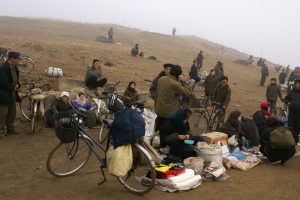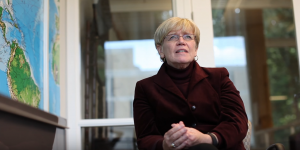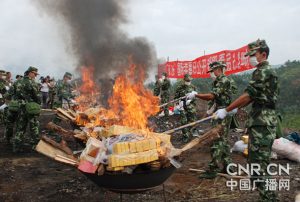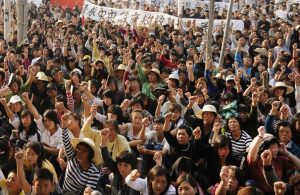‘Normalizing’ same-sex marriage in the US and gay rights in Japan
At first glance, the 2012 Presidential election in the United States may seem to have nothing to do with gay rights in Japan. But President Obama’s reelection may have a significant impact on the future of same-sex marriage in the States, which is likely to create ripple effects in Japan.
Bureaucratic Red Tape Chokes Free Markets in India
India auctioned 3G licenses for USD $14.78 billion in 2010, a bonanza for a government staring at a large fiscal deficit and trying to promote inclusive growth through a host of populist social schemes. With new telecom auctions scheduled soon, the government hopes to generate more money to pare its fiscal deficit, and bolster its reformist credentials to foreign and domestic investors.
Post-socialism, North Korean Style: With State Economy in Ruins, Workers Look Elsewhere for Employment
North Korea is often described as the “world’s last Stalinist state,” but this is misleading. While the facade of a Stalinist economy remains visible in Pyongyang, the nation’s capital, the socialist regime has long become an empty shell. The North Korean economy is now dominated by legal, semi-legal, and entirely illegal private enterprises that provide employment for workers who have failed to make ends meet in the formal economy. As such, it more closely resembles a post-socialist Eastern European economy than a Stalinist one.
Mongolia: Gauging Inner Asian Tensions over Railways
Broad gauge or standard gauge railway? This domestic Mongolian debate reflects Inner Asian ambivalence toward economic opportunities through engagement with China, as well as broader geopolitical and economic competition between Russia and China. After he was fired from the post of Director of the Mongolian Railway on January 10, former Prime Minister M. Enkhsaikhan criticized the government’s plan to extend the domestic broad (Russian) gauge railroad network. Instead, he argued for a 267 km standard (Chinese) gauge railroad from Tavan Tolgoi, a coal mining deposit, to Gashuun Sukhait, a Sino-Mongolian border post. With this argument Mr. Enkhsaikhan triggered another round of the debate over narrow vs. broad gauge.
Beauty Queens in Post War Japan (Video with Dr. Jan Bardsley)
The study of Japanese beauty queens offers insights into democracy and gender issues in post-war Japan. In the 1905s, Japanese beauty queens were often celebrated as models of democracy. They were confident, willing to travel overseas, and represented the idea of upward social mobility. This captured the imagination of Japanese women and for some, signified a step forward for Japanese women’s rights.
However, women in the beauty contests were constructed as images, only allowed to say certain things and unable to complain. This image of beauty queens belies the true situation of Japanese women in the 1950s who were protesting over a lack of equality.
Methamphetamine Smuggling along the Myanmar-China Border Threatens Local Communities
The Golden Triangle, the mountainous region bordering Myanmar, Vietnam, Laos and Thailand, is known as a major centre for drug production. Since Khun Sa, kingpin of the region’s heroin trade, was forced into retirement in 1996, large-scale production of methamphetamine has developed along the Myanmar-China border. Unlike heroin, methamphetamine can be created from commercially available chemicals, commonly found in cold and flu medications. The easy availability of raw materials means that the profits generated from the production of methamphetamine are higher than those from heroin.
Reform in Malaysian Party Politics: Reasons for Slow Change in UMNO
Trying to reform a dominant political party by changing the status quo can precipitate conflict and instability, particularly if conservatism has become ingrained in its political practices. One such dominant party, the United Malays National Organization (UMNO), has been beleaguered by vociferous calls for reform since its uncharacteristically mediocre performance in Malaysia’s general elections of March 2008. As the commanding group in the Barisan Nasional coalition, which has ruled Malaysia continuously since 1957, the UMNO has not been confronted with any serious challenge to its uninterrupted hold on power, particularly during the twenty-two-year rule of political strongman Mahathir Mohamad (1981-2003).
Collective Protests in China and India: Unexpected Similarity?
Collective protests against corruption and land grabs are widespread in both China and India. The official Chinese Academy of Social Sciences reported that the government spent $110 billion on containing these and related popular protests in 2011, more than the defense budget. Many argue that disruptive protests erupt because there are no effective institutional channels, such as the judiciary, for expressing grievances in China. However, in neighboring India, the world’s biggest democracy where such channels do exist, people similarly express their discontent through disruptive protests. Though not yet systematically counted, disruptions, both violent and non-violent, are an essential characteristic of Indian democracy.
China’s Liberalizing Impact on Global Commodity Markets
Memo #195 – China played a key part in the recent collapse of the iron ore pricing regime. This was an unintended consequence of a mix of bold negotiating tactics and competing domestic interests, which made it difficult to implement a consistent international procurement policy. Chinese actions destabilized global market institutions and paradoxically caused their liberalization.
Digital Generation in Papua New Guinea Emerges
Memo #194 – Next month, Australian Foreign Minister Bob Carr will make his maiden visit to Papua New Guinea (PNG), Australia’s nearest neighbour and second largest recipient of Australian foreign aid. This visit comes 10 months after the then brand-new foreign minister threatened PNG with sanctions following suggestions from within the PNG government that national elections might be delayed. Not surprisingly, these threats did not go down well with Papua New Guineans. But ironically, Foreign Minister Carr can take partial responsibility for inspiring a new, digital generation of Papua New Guineans to engage in public discussion.









